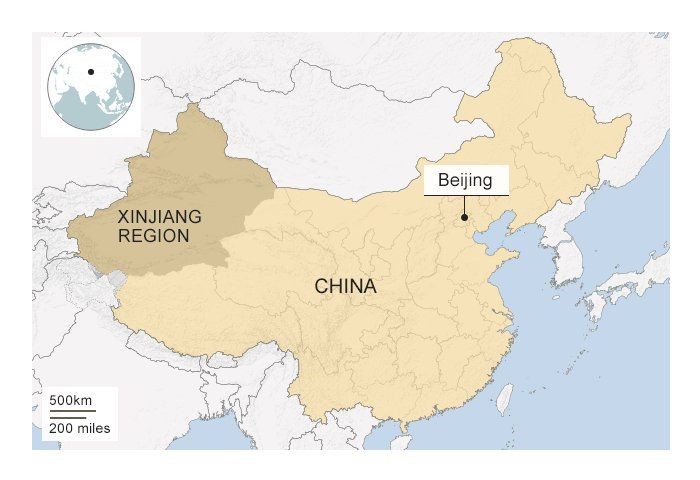Muslim Uighur community in Xinjiang

Copyright infringement is not intended
Context: Forty-three countries have called on China to “ensure full respect for the rule of law” for the Muslim Uighur community in Xinjiang.
- The declaration, signed by the United States, European countries and Asian member states, accused China of human rights violations against the Uighurs, including torture, forced sterilisation and forced disappearances.
- It asked China to allow immediate access to Xinjiang for independent observers, including the UN High Commissioner for Human Rights.
- Beijing has long denied accusations of ethnic cleansing against Uighurs and other Muslim Turkic people in Xinjiang, where experts have estimated that more than one million people are incarcerated in camps.
Who are the Uyghurs?
- There are about 12 million Uyghurs, mostly Muslim, living in Xinjiang, which is officially known as the Xinjiang Uyghur Autonomous Region (XUAR).
- The Uyghurs speak their own language, which is similar to Turkish, and see themselves as culturally and ethnically close to Central Asian nations. They make up less than half of the Xinjiang population.
- Recent decades have seen a mass migration of Han Chinese (China's ethnic majority) into Xinjiang, allegedly orchestrated by the state to dilute the minority population there.
- China has also been accused of targeting Muslim religious figures and banning religious practices in the region, as well as destroying mosques and tombs.
- Uyghur activists say they fear that the group's culture is under threat of erasure.
Where is Xinjiang?
- Xinjiang lies in the north-west of China and is the country's largest region.
- Like Tibet, it is autonomous, meaning - in theory - it has some powers of self-governance. But in practice, both regions are subjected to major restrictions by the central government.
Xinjiang
- Xinjiang is a mostly desert region and produces about a fifth of the world's cotton.
- Human rights groups have voiced concerns that much of that cotton export is picked by forced labour, and in 2021 some Western brands removed Xinjiang cotton from their supply chains, leading to a backlash against the brands from Chinese celebrities and netizens.
- The region is also rich in oil and natural gas and because of its proximity to Central Asia and Europe is seen by Beijing as an important trade link.

- In the early 20th Century, the Uyghurs briefly declared independence for the region but it was brought under the complete control of China's new Communist government in 1949.
What are the allegations against China?
- Several countries, including the US, Canada and the Netherlands, have accused China of committing genocide - defined by international convention as the "intent to destroy, in whole or in part, a national, ethnical, racial or religious group".
- China has been forcibly mass sterilising Uyghur women to suppress the population, separating children from their families, and attempting to break the cultural traditions of the group.
What does China say?
- China denies all allegations of human rights abuses in Xinjiang.
- It said it 2019 that it had released everyone from its "re-education" camp system, though testimony from the region suggests many are still detained and many were transferred from camps to formal prisons.
- China says the crackdown in Xinjiang is necessary to prevent terrorism and root out Islamist extremism and the camps are an effective tool for re-educating inmates in its fight against terrorism.
- It insists that Uyghur militants are waging a violent campaign for an independent state by plotting bombings, sabotage and civic unrest, but it is accused of exaggerating the threat in order to justify repression of the Uyghurs.
- China has dismissed claims it is trying to reduce the Uyghur population through mass sterilisations as "baseless", and says allegations of forced labour are "completely fabricated".



1.png)
